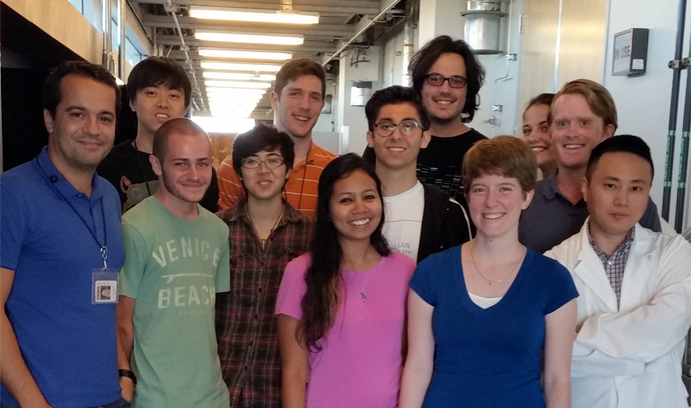Pushing the envelope with genome editing

Leonidas Bleris ’06 Ph.D. (left) and his research group at UT Dallas seek to develop new treatments that reverse disorders by regulating gene expression.
Leonidas Bleris, who earned a Ph.D. in electrical engineering from Lehigh in 2006, is poised to become a leading researcher in the field of genome editing, a field that will likely transform the way diseases and disorders are treated.
Bleris, now an assistant professor of bioengineering at The University of Texas at Dallas (UT Dallas), was recently awarded $400,000 in funding for five years of research from the National Science Foundation’s (NSF) Faculty Early Career Development (CAREER) Program.
The award recognizes junior faculty members who exemplify the dual role of teacher and scholar.
“The CAREER Award is recognition by some of the best researchers in his field of the significance of his work and their confidence in Dr. Bleris’ abilities,” says Robert Rennaker, head of the department of bioengineering at UT Dallas.
With the NSF award, Bleris hopes to push the boundaries of genome-editing technologies.
Greater precision in genome editing
What is genome editing? Thanks to the Human Genome Project, which provided the complete genetic blueprint of a human being, researchers have been able to study the mutations, or errors, in the genome that cause disease. The hope is to correct these errors by genome editing (adding, replacing or removing DNA bases) much like an editor revises and improves a writer’s work by adding, replacing or removing words.
“This is a revolutionary era for biomedical engineers,” says Bleris. “We now have the ability to control and modify the genome at a single nucleotide resolution.”
This allows researchers such as Bleris to create disease models and novel therapeutics that reverse a disorder by genome editing. Bleris’ lab will focus on cancer therapeutics using TALE libraries in high-throughput experiments. High-throughput refers to a technology that enables researchers to accelerate chemical, genetic or pharmacological tests.
“TALEs are newly discovered proteins that can be engineered to target specific nucleotide sequences in cells and can act as regulators of gene expression at the transcriptional level,” says Bleris.
Bleris says his time at Lehigh was instrumental in getting him to where he is today. He earned his Ph.D. in electrical engineering under the supervision of Mayuresh Kothare, the department chair and R.L. McCann Professor of chemical and biomolecular engineering.
“My education at Lehigh has been extremely important for my career path,” says Bleris, who cites the “high-quality graduate level courses, inspiring faculty, vivid academic environment and beautiful campus” as just a few of the reasons he cherishes the time he spent here.
“I was fortunate to work with Professor Kothare, who taught me the fundamentals of dynamical systems and control theory. I use similar principles today when studying cells; I think about dynamic states, ways to interfere and control a biological network and eventually a cellular phenotype.”
In addition to the CAREER Award, Bleris has received other grants from NSF and from the National Institutes of Health (NIH) as well as a joint NSF/NIH grant.
His research has been published in leading science journals such as Nature Biotechnology, Nature Nanotechnology and EMBO Press’ Molecular Systems Biology.
Bleris joined UT Dallas’ Erik Jonsson School of Engineering and Computer Science in 2009 after a postdoctoral research appointment at Harvard University’s FAS (Faculty of Arts and Sciences) Center for Systems Biology. A native of Greece, he completed his undergraduate degree in electrical engineering at Aristotle University of Thessaloniki.
Story by Rosa Rojas
Posted on:

